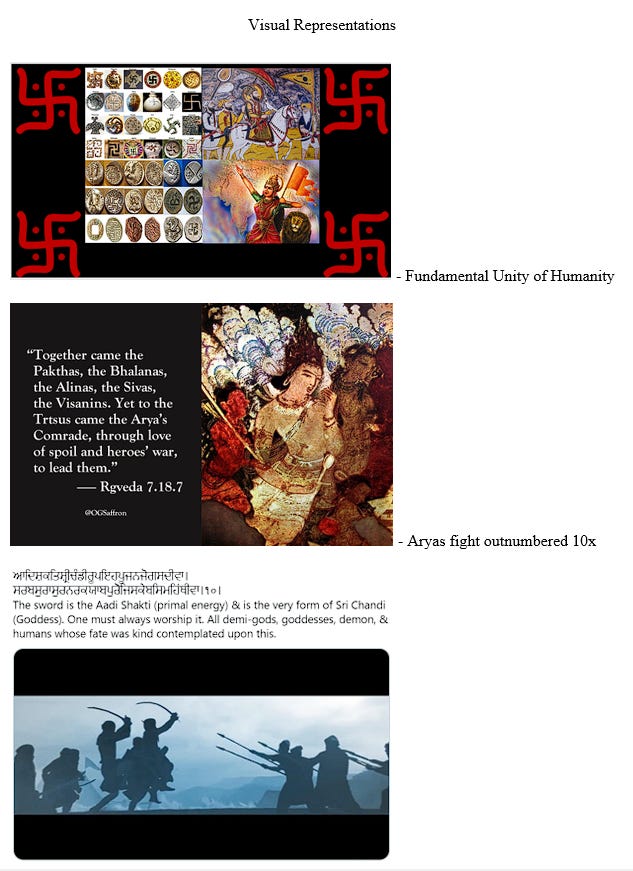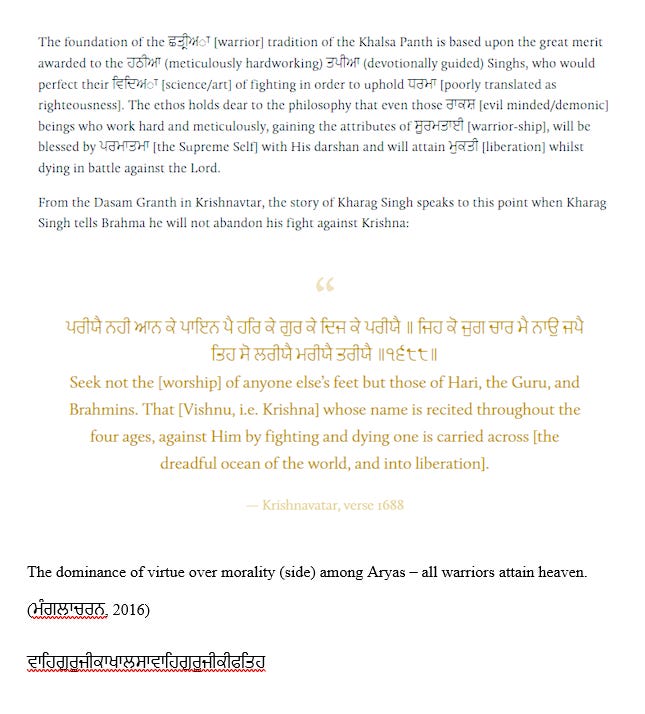Individual Authority
ਸਿੰਘਰੁਚੈਸਦਭੋਜਨੁਮਾਸ॥ਰਣੁਦੇਖਿਸੂਰੇਚਿਤਉਲਾਸ॥
A Singh (tiger) craves flesh. Looking at the field of battle, a warrior’s heart is delighted.
ਕਿਰਪਨਕਉਅਤਿਧਨਪਿਆਰੁ॥ਹਰਿਜਨਕਉਹਰਿਹਰਿਆਧਾਰੁ॥੩॥
A miser adores his wealth. The servants of Hari, place their faith in Hari.
Adi Guru Granth Sahib, Ang 1180.
Early modern and modern political philosophy (Liberalism) weaves a complex relationship between the individual and community as well as, authority and power. However, it mischaracterizes them, and seeks to subdue competitors through a false reading of human nature. Communities give rise to individuals, while ultimate authority and power rest in war. Morality is formed by warfare, and by monopolizing violence Liberalism seeks humanity’s enslavement in a form of political monotheism. However, the liberal state is increasingly unable to defend its economic and demographic heartlands. Nevertheless, humanity must struggle against it under the path of the sword, ordained by the Mother, the Great Death.
A love of battle is the most frequently cited reason for Sikh militancy in the 1980s CE (Jodhka, 2001, p. 4). When compared to grievances against the state or religious atrocities, the ratio is four to one in favour of a simple desire for war (Jodhka, 2001, p. 3-5). Benjamin Constant in his 1819 treatise entitled The Liberty of Ancients Compared with that of Moderns states that the ancient concept of sovereignty is simply, the capacity to make war (Constant, 1819, p. 2).
The endemic nature of war refutes Hobbes’ solitary struggle, Locke’s peaceful man, and Rosseau’s virtuous savage (Arnhart, 2018, p. 2-4). Larry Arnhart concludes that human society and morality is formed by wartime cooperation (Arnhart, 2006, p. 2). The selection pressures of war have intensely impacted male physicality. Traits such as beards, broad shoulders, and faster reaction times are some examples (Brett, 2016, p. 1-3) (Sell, Hone & Pound, 2012, p. 1-3). Furthermore, many skills of the hunt are interchangeable with war. Humans war even in the absence of a state or well-developed material culture, such as among Australian hunter-gatherers (Arnhart, 2006, p. 1-2; Arnhart, 2018, p. 1-3).
ਸੁੱਖਾਫੀਮਸ਼ਰਾਬਕਬਾਬੈਂਛਕੈਂਜਿਤਿਕਮਨਭਾਵੈ।।ਖੇਲੈਨਿੱਤਸ਼ਿਕਾਰਬਨਨਮੈਂਮਾਰਿਮ੍ਰਿਗਬਹੁਖਾਵੈਂ।।
[The Singhs] consume marijuana, opium, alcohol and kebabs to their hearts delight.
They constantly hunt in the forest, consuming and killing many deer.
ਘੋੜਨਪਰਅਸਵਾਰਹੋਇਕਰਿਸਜਕੈਸ਼ਸਤ੍ਰਸਾਰੇ।।ਭਾਂਤਿਭਾਂਤਿਕੀਪਹਿਨਪੁਸ਼ਾਕਾਂਕਰੈਕੁਵੈਦਅਪਾਰੇ।
Riding atop horses, [the Singhs] adorn themselves with weapons.
Adorning the dress [of warriors], they engage in endless military exercises. (ਮੰਗਲਾਚਰਨ, 2019b).
ਸਿਖਮਤਵਿਚਅਕਾਲਪੁਰਖਜੀਦਾਪ੍ਰਤੱਖਦਰਸ਼ਨਗੁਰੂਗ੍ਰੰਥਸਾਹਿਬਜੀਦਾਹੈਅਥਵਾਗੁਰਾਂਸੰਤਾਂਦਾਹੈ।।ਤਥਾਹੀਭਗਵਤੀਦਾਪ੍ਰਤੱਖਧੇਇਸਰੂਪਸ੍ਰੀਸਾਹਿਬਆਦਿਕਸ਼ਸਤ੍ਰਾਂਅਸਤ੍ਰਾਂਦਾਦਰਸ਼ਨਹੈ।।
In Sikhi, to the view the [sargun or physical] form of Akal Purakh look towards Sri Guru Granth Sahib Ji as well as, Saints. To view the [sargun] form of Bhagvati [Devi, Chandi, Goddess or Warmother] look to weapons [Astar and Shastar – missle and melee]. (ਮੰਗਲਾਚਰਨ, 2019a).
Loud may we speak, with heroes, in assembly.
Rig Veda II.XXXIII
ਪ੍ਰਿਥੀਸੁਰਗਕੋਰਾਜਘਨੇਰਾ।।ਓਜਸੁਰਾਸਰਕੇਰਿਬਡੇਰਾ।।
Rule of both Earth and Heavens is obtained.
Weapons are greater than Gods and Demons.
ਸਭਿਸ਼ਸਤ੍ਰਨਿਕੇਹੈਅਨੁਸਾਰੇ।।ਜੋਇਨਧਰੈਸੁਹੁਇਬਲਭਾਰੇ।।
All depends on weapons.
Who adorns them becomes laden with power.
Sri Suraj Prakash Granth – Vol 1 – P. 47
The individual relies on the community for protection, and in turn, protects the community. This cycle precedes Homo Sapiens as a species, and thus the liberal individual is a myth (Arnhart, 2008, p. 2-4). No community consists of an individual, however every individual is born into a community. This is reinforced by studies which show the co-evolution of genes and culture (Frost & Harpending, 2015, p. 1-5; Jayman, 2013, p. 1-5). Modern democratic theorists such as Robert Dahl (1998) and Jack Lively (1975) have stressed the need for constituents to control the outcome or decision-making process of a polity (Dahl, 1998, p. 1-3; Lively, 1975, p. 23). Both effective participation, and final control over the agenda are necessities of democracy (Dahl, 1998, p. 4). However, the nature of the liberal state impedes control and participation.
Modern nation states do not collapse into anarchy, but clan rule. This is seen in Syria, Iraq, Afghanistan and Libya among others. Liberal individualism is enforced on clans, and not the result of natural human development (Arnhart, 2014, p. 1-3). Therefore, those who do not give up their clan, and adopt Liberalism are absent from the state. The Liberal state is a participative theocracy. People are free to be Liberal, and join Liberalism; that is its freedom.
Liberal philosophers such as John Madison or John Stuart Mill see the individual in need of protection from an overbearing community. Ideas of the greater good or general will (Rosseau) lead to the centralization of authority, and erosion of non-liberal power structures (Held, 2006, p. 86-108). As Jan Assman explains in The Price of Monotheism the Mosaic distinction requires in-group violence to be moral, and the adversary to be inherently immoral (Assman & Savage, 2010, p. 8-80).
One modern example is the politics of fear, and securitization. State-friendly media creates a moral panic over a certain group or practice which then demands the state’s attention (Debrix and Barder, 2009, p. 1-3). This attention is predicated on a monopoly of violence and morality which is challenged by practices such as the Kirpan (Dhamoon, 2013, p. 1-4). Modern liberal philosophy is a monotheistic worship of the state. The state subjugates competing moral-militarist factions, and desacralizes or delegitimizes them. The celebration of this triumph is akin to casting down false idols (Assman & Savage, 2010, p. 20-40).
ਖੰਡਾਪ੍ਰਿਥਮੈਸਾਜਕੈਜਿਨਸਭਸੈਸਾਰੁਉਪਾਇਆ॥
That which created the Khanda (double-edged sword) and then the whole world.
Sri Guru Dasam Granth Sahib – Chandi Di Var (Ballad of the Warmother)
Factions must surrender their war-making authority to join the state. This is slavery by the ancient definition of liberty (Constant, 1819, 2-5). Coercive legal authority is the root of sovereignty, and its removal amounts to destruction (Arnhart, 2014, p. 3). Increasingly, non-liberal entities have been securing justice for the common people.
An example, is the dominance of Sikh clan networks and religious institutions in the Indian farmer’s protest (dhanuraashi, 2022, p. 1-3). Village chiefs used their coercive authority to push bodies and supplies to the borders of Delhi. Sikh religious institutions such as langar (community kitchens) mean that the skills to provision a large garrison are widespread among the populace. Similarly, the Talibs or teacher-student networks in Afghanistan serve as an alternate moral-militarist structure in the wake of constant destruction.
The Soviet-led Communists, and American-led Democrats were both defeated by this network. Soviet Central Planning, and the American cultural-economic matrix were outdone by blood honour (Greer, 2022, 1-5). The Talibs are able to simultaneously dictate a new vision for Afghanistan, while respecting prevailing mores. Fundamentally, the Talibs were able to absorb local clan militias, while the Soviets and Americans sought to replace them with a central army.
While the issue of individual privacy against an overbearing community has been explored by Constant, Bentham and Mills as well as, John Stuart Mill the problem is cyclical (Constant, 1819, p. 2-5; Held, 2006, p. 80-108). The rise of a network society and surveillance state has eroded individual privacy, despite the existence of a liberal legal order (Castells, 2009, p. 1-20). Counter-hegemonic institutions such as panchayats, and local religions have stood up for the common man in place of the liberal state (de Sousa Santos & Avritzer, 2007, p. 1-15).
Liberalism demands total surrender, and takes steps to make good on these terms. In return, its philosophers (apologists) construct a false narrative to justify its ends. Man has always been at war, competing, fighting, and co-operating. Nowhere, is the rational liberal individual found. Liberalism merely continues the war on non-state violence (identity) sanctioned by the medieval Christian church (Frost & Harpending, 2015, p. 4-6). This war includes an attack on strong identities which obstruct the state or divide loyalties (hbdchick, 2013, p. 1-3). White nationalist author Lothrop Stoddard noted in The Rising Tide of Color that this war would consume the European ethnos (Stoddard, 1920, 1-15).
Materially, the liberal state is meant to act as gatekeeper and regulator of the marketplace. The state protects commerce, and regulates the market for the greater good (Held, 2006, p. 80-96). Increasingly, the state is unable to regulate trans-national actors enabled by a cosmopolitan discourse. Power flows into the hands of those who rally resources across national boundaries, and protect the poor (Castells, 2009, p. 20-35; Fuchs, 2009, p. 2-5). These trans-national actors such as the Khalsa (Sikh military) are not liberal (Shani, 2008, p. 1-3).
Liberalism views the community as formed by individuals, rather than the community shaping its members. The liberal state of nature, and liberal individual are myths. These myths enable the liberal state to subjugate competitors. Thus, liberalism is a political monotheism viewing competing factions the way a monotheist faith views other religions. Liberalism’s myth of peace is undone by the pervasiveness of war, and its essential role in shaping humans. By rejecting or monopolizing the discourse on war, Liberalism attempts to enslave humanity. Thus, humanity must resist, guided by the path of the sword, under the Mother, the Great Death.
References
Arnhart, L. (2006, July 23). The desire for war. Darwinian Conservatism. Retrieved August 9, 2022, from https://darwinianconservatism.blogspot.com/2006/07/desire-for-war.html
Arnhart, L. (2014, January 21). Hobbes's liberal Leviathan and the rule of the clan. Darwinian Conservatism. Retrieved August 9, 2022, from https://darwinianconservatism.blogspot.com/2014/01/hobbess-liberal-leviathan-and-rule-of.html
Arnhart, L. (2018, August 10). War and the Lockean State of nature in Aboriginal Australia. Darwinian Conservatism. Retrieved August 9, 2022, from https://darwinianconservatism.blogspot.com/2018/08/war-and-lockean-state-of-nature-in.html?m=0
Assmann, J., & Savage, R. (2010). The price of monotheism. Stanford University Press.
Brett. (2021, June 3). How men are evolved for fighting according to Science. The Art of Manliness. Retrieved August 9, 2022, from https://www.artofmanliness.com/health-fitness/fitness/how-men-are-evolved-for-fighting-according-to-science/
Castells, M. (2010). Chapter 1: Power in the Network Society. In The rise of the network society (pp. 1–44). essay, Wiley-Blackwell.
Constant, B. (n.d.). The Liberty of Ancients Compared with that of Moderns (1819). Online library of liberty. Retrieved May 15, 2022, from https://oll.libertyfund.org/title/constant-the-liberty-of-ancients-compared-with-that-of-moderns-1819
Dahl, R. A. (1998). On democracy. Yale University Press.
de Sousa Santos, B., & Avritzer, L. (2005). Introduction: Opening up the Canon of Liberal Democracy. In Democratizing democracy: Beyond the liberal democratic canon (pp. xxxiv-lxxiv). chapter, Verso.
Debrix, F., & Barder, A. D. (2009). Nothing to fear but fear: Governmentality and the biopolitical production of Terror. International Political Sociology, 3(4), 398–413. https://doi.org/10.1111/j.1749-5687.2009.00083.x
Dhamoon, R. K. (2013). Exclusion and regulated inclusion. Sikh Formations, 9(1), 7–28. https://doi.org/10.1080/17448727.2013.774709
dhanuraashi, D. (2022, February 7). Lessons for localists: The Great Indian Farm Revolt of 2020-2021. Doomeroptimism. Retrieved August 9, 2022, from https://doomeroptimism.substack.com/p/lessons-for-localists-the-great-indian
Fuchs, C. (2009). Some reflections on Manuel Castells’ book “Communication power.” TripleC, 7(1), 94–108. https://doi.org/10.31269/triplec.v7i1.136
Greer, T. (2022, April 15). The Taliban were Afghanistan's real modernizers. Palladium. Retrieved August 9, 2022, from https://palladiummag.com/2022/04/15/the-taliban-were-afghanistans-real-modernizers/
hbdbick. (2013, July 12). Whatever happened to European tribes? hbdchick. Retrieved August 9, 2022, from https://hbdchick.wordpress.com/2011/04/04/whatever-happened-to-european-tribes/
Held, D. (2006). Models of democracy (3rd ed.). Polity.
Jayman. (2013, September 25). No, you don't have free will, and this is why. The Unz Review. Retrieved August 9, 2022, from https://www.unz.com/jman/no-you-dont-have-free-will-and-this-is-why/
Jodhka, S. S. (2001). Review: Looking Back at the Khalistan Movement: Some Recent Researches on Its Rise and Decline. Economic and Political Weekly, 36(16), 1311–1318. Retrieved from https://www.jstor.org/stable/4410511.
Lively, J. (1975). Democracy. ECPR.
Mandair, N. (2009). An approximate difference: Proximity and oppression in the West's encounter with Sikhism. Sikh Formations, 5(2), 85–101. https://doi.org/10.1080/17448720903408281
Scarre, C., & Fagan, B. M. (2016). Ancient civilizations (4th ed.). Routledge.
Sell, A., Hone, L. S., & Pound, N. (2012). The importance of physical strength to human males. Human Nature, 23(1), 30–44. https://doi.org/10.1007/s12110-012-9131-2
Shani, G. (2008). Toward a post-western IR: The Umma, Khalsa Panth, and Critical International Relations Theory. International Studies Review, 10(4), 722–734. https://doi.org/10.1111/j.1468-2486.2008.00828.x
Sooklal, A., & Pillay, P. R. (1991). GURU NANAK, SIKHISM AND THE CLAMOUR FOR KHALISTAN. Journal for the Study of Religion, 4(2), 45–63. Retrieved from https://www.jstor.org/stable/24764245.
Stoddard, T. L. (1920). The Rising Tide of Color. The Project Gutenberg. Charles Scribner's Sons. Retrieved August 9, 2022, from https://www.gutenberg.org/files/37408/37408-h/37408-h.htm.
ਮੰਗਲਾਚਰਨ. (2019, May 12). Devi in Khalsa Dharam Shaastar. Manglacharan. Retrieved August 21, 2022, from https://www.manglacharan.com/post/devi-in-khalsa-dharam-shaastar
ਮੰਗਲਾਚਰਨ. (2019, May 16). "[the Singhs would] engage in endless military exercises" - naveen panth prakash [1880]. Manglacharan. Retrieved August 9, 2022, from https://www.manglacharan.com/post/the-singhs-would-engage-in-endless-military-exercises-naveen-panth-prakash-1880





